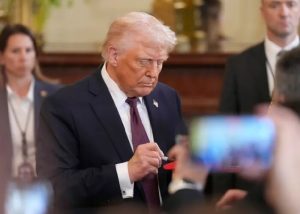PNN – While engaging in tariff disputes with dozens of countries around the world, Trump is pursuing a war with the Yemenis, not an economic one, but a purely military one. For many, the question is: what motives are driving the US president, who claims to be a peacemaker, to engage in military action in the Middle East?
American attacks on Yemen’s Ansarullah have been making headlines in the region and around the world in recent weeks. In this regard, CNN reported Friday night, citing informed sources, that the US military action against Yemen has so far cost about $1 billion but has had “limited impact on destroying the capabilities of the Houthis.”
According to the report of Pakistan News Network, the American network, citing three unnamed sources, reported that hundreds of millions of dollars worth of ammunition, including long-range JASSM cruise missiles, JSOW guided bombs, and Tomahawk missiles, were used during the US military invasion that began on March 15.
Read more:
Regarding Trump’s motives for launching the military invasion of Yemen, The Guardian writes: The US president is following the failed approach of Biden and previous US presidents towards Yemen, whose attacks have disrupted global shipping. This policy was previously followed during Biden’s presidency in January last year. At that time, the US government, along with Britain, launched missile strikes against dozens of targets in Yemen. But the Yemenis did not back down, increasing their attacks on ships and shipping lanes and continuing to fire drones and missiles at Israel. Since July 2024, Israel has carried out four rounds of airstrikes against Yemen, including attacks on Sanaa International Airport, power plants, and several other ports; attacks that have now been resumed by Trump with the same goal.

Since the beginning of Trump’s military attack on Yemen, various analyses have been put forward regarding the objectives of these actions. In addition to affecting the United States’ relations with the countries of the region, these attacks had numerous consequences in the field of regional security and international relations, and are of interest to analysts and political observers, especially since the United States pursued various objectives by adopting this approach. Examining the causes and goals of these attacks can shed light on various aspects of US foreign policy in the Middle East, especially since the subject of Trump’s letter to Iran and the Islamic Republic’s response to the United States is one of the hot topics these days. The US wants negotiations, and Iran considers indirect negotiations to be acceptable, but Israel says that negotiations and agreements will not be reached. Trump’s promises, which still have an election atmosphere, regarding Iran, Ukraine, Yemen, and the Middle East, have caused analysts to have different views on Trump’s renewed attack on Yemen.
The New York Times has an analytical report on this subject, which states in part: The United States is not dependent on the Suez Canal because its maritime trade with Asia is conducted through the Pacific Ocean and with Europe through the Atlantic Ocean. However, international transit experts believe that the Suez Canal is still of great importance to the United States. This importance has become even more apparent in recent years, when other sea routes, such as the Panama Canal, which Trump has been eyeing, have been restricted.

This issue is also evident in the analysis of other Western media outlets such as Foreign Policy and The Atlantic, which state that maintaining the security of waterways and global trade is important to Trump, who is an international businessman. Therefore, one of the United States’ other goals in attacking Yemen is to ensure the security of these waterways and prevent any threat to global trade. From this perspective, the naval actions of the Ansarullah forces caused great concern, as any disruption to the flow of maritime trade could have widespread effects on the global economy.
Another analysis published in the Washington Post identified pragmatism as one of the prominent features of Trump’s foreign policy. The report states: The US president, who always seeks to make quick decisions without diplomatic complications, also tried to demonstrate a kind of pragmatism in the case of Yemen. With immediate decisions and the use of military force, Trump is trying to eliminate immediate regional threats and strengthen the US position in the region. This approach, described by many analysts as quick decisions based on immediate needs, clearly demonstrated Trump’s willingness to use military means to advance his foreign policy goals.

